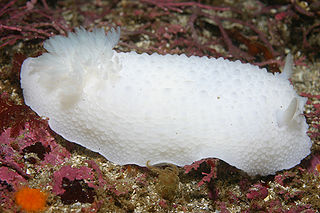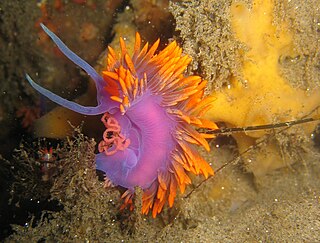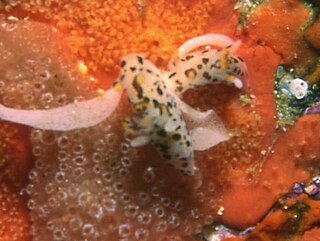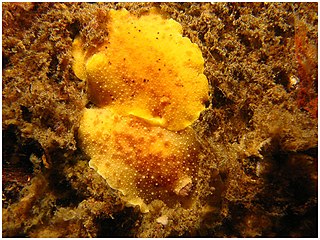
Digenea is a class of trematodes in the Platyhelminthes phylum, consisting of parasitic flatworms with a syncytial tegument and, usually, two suckers, one ventral and one oral. Adults commonly live within the digestive tract, but occur throughout the organ systems of all classes of vertebrates. Once thought to be related to the Monogenea, it is now recognised that they are closest to the Aspidogastrea and that the Monogenea are more closely allied with the Cestoda. Around 6,000 species have been described to date.

Doridoidea, commonly known as dorid nudibranchs, are a taxonomic superfamily of medium to large, shell-less sea slugs, marine gastropod mollusks in the clade Doridacea, included in the clade Nudibranchia.

The Polyceridae are a taxonomic family of sea slugs, dorid nudibranchs, marine gastropod mollusks within the superfamily Polyceroidea.
Callochiton is a genus of chitons in the family Callochitonidae.
Aillyidae is a family of air-breathing land snails, terrestrial pulmonate gastropod mollusks in the informal group Sigmurethra.

Plagiorchiida is a large order of trematodes, synonymous to Echinostomida. They belong to the Digenea, a large subclass of flukes. This order contains relatively few significant parasites of humans.

Echinostomata is a suborder of the parasitic flatworm order Plagiorchiida. The suborder contains numerous species that are parasitic in humans.

Cadlina is a genus of sea slugs, dorid nudibranchs, shell-less marine gastropod mollusks historically classified in the family Chromodorididae. Recent research by R.F. Johnson in 2011 has shown that Cadlina does not belong to the family Chromodorididae. She has therefore brought back the name Cadlinidae from synonymy with Chromodorididae. The family Cadlinidae also includes the genus AldisaBergh, 1878.

Halgerda is a genus of sea slugs, dorid nudibranchs, shell-less marine gastropod mollusks in the family Discodorididae.
Micrelenchus is a genus of small sea snails that have shells with pearly interiors and an operculum. They are marine gastropod molluscs in the family Trochidae, the top snails or top shells.

The Aeolidida is a taxonomic clade of sea slugs, specifically aeolid nudibranchs, marine gastropod molluscs in the clade Cladobranchia. They are distinguished from other nudibranchs by their possession of cerata containing cnidosacs.

Fionoidea is a superfamily of small sea slugs, aeolid nudibranchs. They are gastropod mollusks within the infraorder Cladobranchia. The families within Fionoidea were shown to be monophyletic on DNA evidence and a re-interpretation of family characteristics was provided.

The Facelinidae are a taxonomic family of colorful sea slugs. These are specifically aeolid nudibranchs. They are marine gastropod molluscs.
Curnonidae is a small family of sea slugs, nudibranchs, shell-less marine gastropod molluscs, in the clade Euthyneura.

Ancula is a genus of sea slugs, specifically dorid nudibranchs, marine gastropod molluscs in the family Goniodorididae.

Eubranchus is a genus of aeolid nudibranch in the family Eubranchidae.

Geitodoris is a genus of sea slugs, dorid nudibranchs, shell-less marine gastropod mollusks in the family Discodorididae.

Gargamella is a genus of sea slugs, dorid nudibranchs, shell-less marine gastropod molluscs in the family Discodorididae.

Zeatrophon is a genus of sea snails, marine gastropod mollusks in the family Muricidae, the murex snails or rock snails.
The Diodorinae, common name keyhole limpets and slit limpets, is a taxonomic subfamily of limpet-like sea snails, marine gastropod molluscs in the family Fissurellidae, the keyhole limpets and slit limpets.














